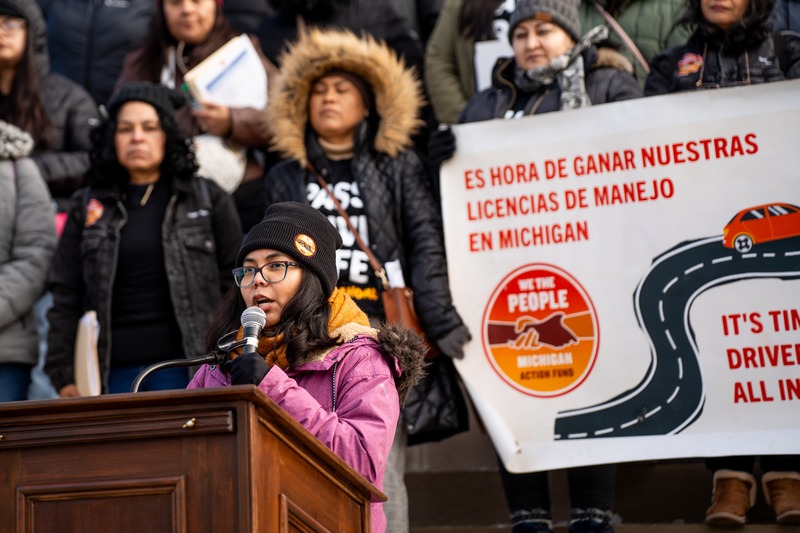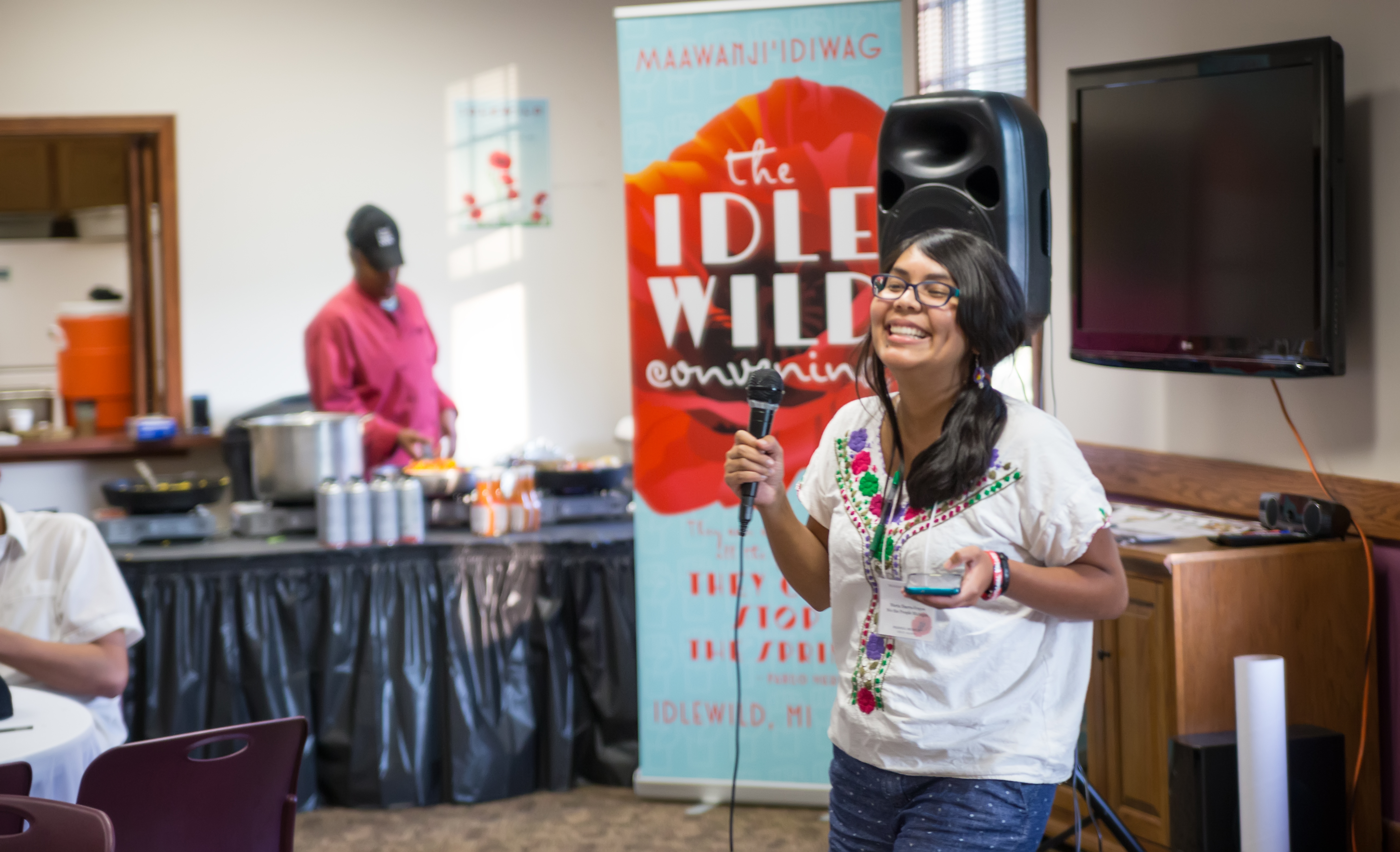Welcome to Amplify, where we feature interviews with immigrant justice field leaders to showcase their work and provide a platform for their perspectives.
In this episode of our Amplify podcast, GCIR President Marissa Tirona speaks with Maria Ibarra-Frayre, Co-Director of We the People Michigan. The organization is committed to building power and strengthening civic engagement for communities across Michigan through disciplined, rigorous, long-term community organizing.
Maria Ibarra-Frayre speaks to a crowd from a podium.
In our latest interview, Maria shares how her personal immigration story led her to become an organizer, what building power means to We the People Michigan, why storytelling is an important tool in the fight for immigrant justice, how philanthropy can better support community organizing, and more.
You can listen to the full interview by pressing the orange play button below. Interview highlights and clips are also featured below.
interview highlights
On Maria’s journey to becoming an organizer at We the People Michigan
“I’d love to start off by sharing a little bit about who I am through storytelling, because at my deepest core I am an organizer, and organizers use stories to share about who they are.
I immigrated to the U.S. when I was 9 years old and I grew up as an undocumented immigrant. This was before anybody was talking about the DREAM Act or DACA or immigration reform. So I spent most of my childhood and adulthood not letting anybody know that I was undocumented. I remember the first time that I ever worked up the courage to tell someone that I was undocumented. I was 17 and I was applying to the University of Michigan. I was in the admission counselor’s office, and she told me that I had been accepted and handed me a scholarship packet. I looked at her and I told her, ‘My story is a little bit different. I’m undocumented.’ And I could just see her face—she was shocked, confused, and didn’t really know what to say. She pulled the scholarship packet back, and then told me to fix my status and then we could talk. That day I went home just feeling so incredibly defeated and alone and powerless.
It took me two years to tell anyone else about my story. It wasn’t until I was invited to an immigrant rights training for undocumented youth when I was in college. I spent a weekend sleeping in a university basement with other undocumented youth, and it was the first time I was around other people who were also undocumented. I just had this lightbulb moment - this is what I am supposed to be doing in the world. But it was also the first time that I felt powerful.
I found We the People Michigan really out of desperation. I was stuck in a job that was a really bad fit for me, and I wanted to do organizing work with people who were directly impacted. We the People was a very new organization, there were only three other people on the team. And I remember learning about who we were and just being like, ‘Is this real? Is this a real organization?’ And, coming onto the team and for the first time, I was exposed to what it means to build a multiracial democracy. We the People Michigan is working to build a working-class community organizing infrastructure across the state of Michigan that is building real power for our people. And it’s about what it looks like to have people from all over the state—from Detroit, to Ben Harbor, to Grand Rapids, to Traverse City, to the Upper Peninsula—to build a rigorous organizing discipline, build a proactive agenda of what our people need and want that is rooted in our communities, and also unifying communities that for years have been told have nothing in common, and really fighting back against some of these narratives that divide our communities. It’s incredible to be building it along the way.”
On how We the People Michigan defines and builds power
“I love talking about power. I think for many people, power is heard as a bad word, that we think of power as control or domination. Power is actually the ability to influence. Power is what happens when you have people who have shared interests, who are moving those interests along, and that happens when you have a strong relationship that ideally is based in values.
We want everybody that we engage with to want to be powerful, to feel and work towards what it will mean for our communities to have the power to decide what it is that we need, and actually go and get it. For us, that looks like building governing power so that our people are the ones that make the decisions about what happens to our community, in our lives, and in our bodies.
Our strategy to build power is actually through relationships, which seems like such a simple thing to say that power comes from building relationships, but the reality is that’s what it takes. So we teach our leaders and our base how to build relationships, how to actually get clear about what you want—and it is ok for you to say what it is that you want. It is not being selfish, it is not thinking only of yourself. It’s actually really important for you to be clear about what it is that you want, and then think about how we can create a community of people who have shared values so we can work for that together.”
Maria smiles as she speaks during a community event.
On what funders can do to better support the needs of those organizing and fighting to preserve our multiracial democracy
“One of the ways that I have actually seen work for building power is building organizing capacity on the ground, and all the extra resources that it takes to do this with people that have been on the margins. That’s work that is not shiny, it’s not a thing that people are super excited to sit in and observe, because it looks like me sitting down with a leader and walking them through what does meeting with a legislator look like? How do we prepare an agenda? How do you share your story? How do you understand the legislation? So it’s a lot of the nitty gritty details that take a lot of time. It takes a lot of money, quite frankly, to be able to run disciplined, rigorous organizing programs that actually develop somebody’s leadership.
I’ll give you an example of a woman who had been to many meetings, had never said anything, she was always very quiet. And then at one of our last meetings, she stood up and she shared how she did not know how to drive, and had never wanted to learn how to drive because she doesn’t have a license. But ever since she started coming to our meetings, she’s taking lessons from her neighbor. Or we have another of our leaders who cleans houses and she sells pan dulce (Mexican sweet bread). Every time she sells pan dulce, she’ll put a little note about the driver’s license campaign in the bag so every person that she sells pan dulce to knows what’s going on with the campaign. And she will tell the people that she cleans houses for, ‘Hey, I need you to vote because I am undocumented, and I clean your house, but I want a license.’ We also have people who are farm workers who have gone to their employer saying, ‘I need to be able to drive the tractor. I want to be able to do my job, and I need to be able to have a driver’s license in order for me to drive the tractor.’
So it’s all of these people who are consistently engaging in so many different ways in their community, and they need resources, they need investment. But that also means that we need to figure out how to have these resources come down from philanthropy in a way that’s going to invest in more than just the election, but the actual sitting down with somebody and saying, ‘I think in six months, you could be the person that’s leading the meeting with this legislator. Let’s talk about what it means for you to be the leader of this team, and how we develop your growth.’ And that’s the thing that oftentimes gets left out and we don’t see, but it’s what we need to be funding.”

